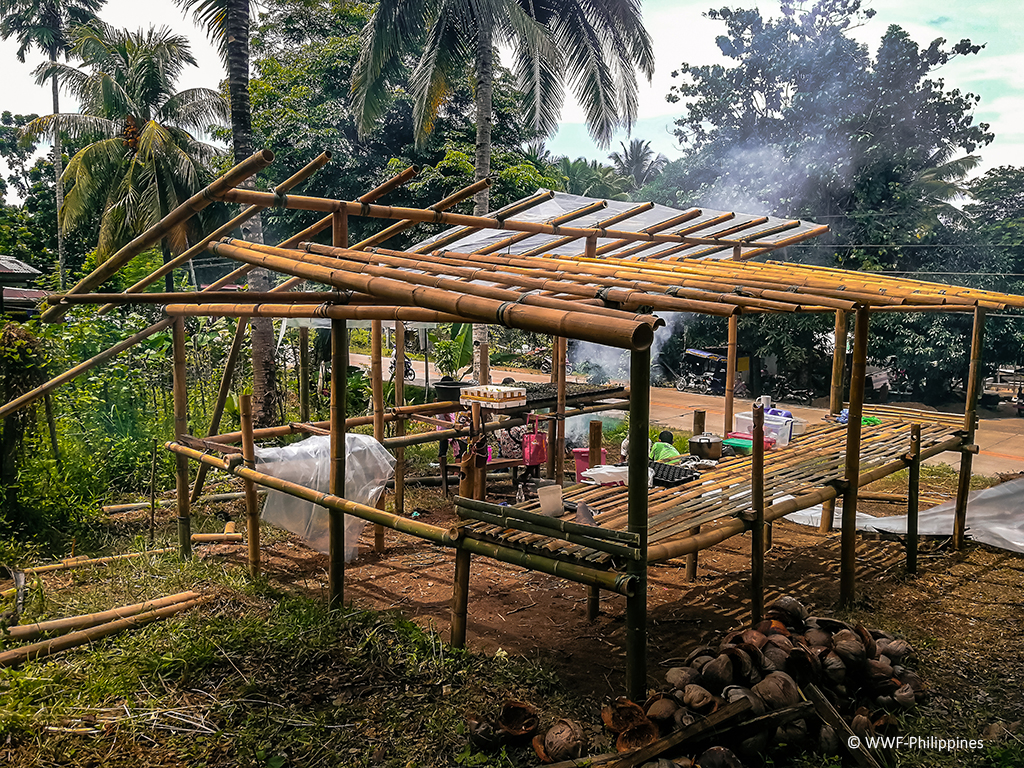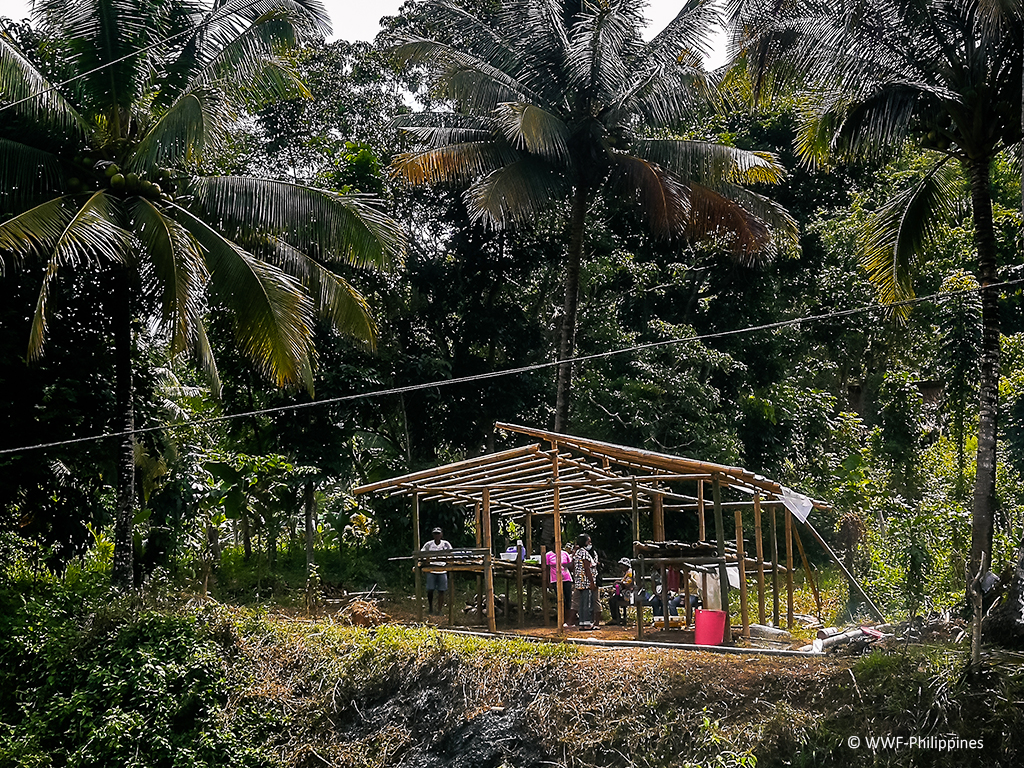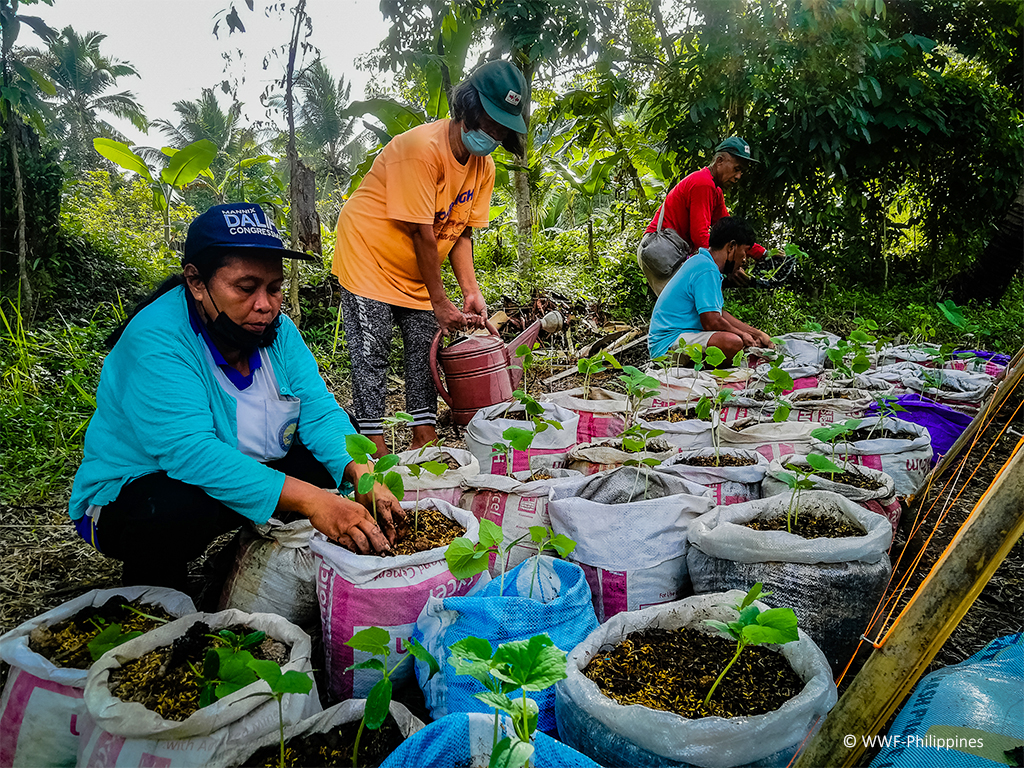Food shed rises in Zamboanga City to combat double burden of poverty, hunger amidst the pandemic
July 7, 2021

The new food shed in Barangay Tigbalabag, Zamboanga City. WWF-Philippines and BPI Foundation have teamed up to bring food sheds to rural communities across the Philippines, in a bid to promote sustainable food security. Photograph © WWF-Philippines
Zamboanga City - The people of Tigbalabag, Zamboanga City are banking on a promising food innovation to help them get back on their feet.
The food shed, which is among the first food sheds under the World Wide Fund for Nature (WWF) Philippines’ and the Bank of the Philiippine Islands (BPI) Foundations’ Project PagSibol, was constructed in Barangay Tigbalabag, a rural farming community north of Zamboanga City.
Tigbalabag has struggled through the pandemic both with an insufficient food supply and with limited capacity to buy from the market due to reduced incomes and lost livelihood. Approximately 40% of Zamboanga City’s supply of vegetables is domestically grown, while the remaining 60% is imported from across the country.
Through their new food shed, the people of Tigbalabag will be able to grow more food year-round for their consumption. Excess produce from the food shed can be given to neighboring communities to further improve food security - or sold, to bring additional income to the barangay.
Additional income will be pooled under the Association of Tigbalabag Sustainable Agripreneurs’ Livelihood (ATSAL), the local peoples’ organization in charge of managing the communities’ agribusiness efforts. These funds will then be invested back in the community, either to fund necessary infrastructure or to provide support to community members through loans.

The food shed, as seen amongst surrounding trees. Each food shed provides nutritious food and livelihood security, while demanding little in terms of land and capital. Photograph © WWF-Philippines
“This food shed has helped us grow our knowledge on new farming technologies that are cost effective, highly doable and easy to replicate,” said ATSAL President Ma. Lourdes Cuadra. Cost effective solutions are good for communities like Tigbalabag, where low incomes are a major issue.
“This food shed is important because it provides us with hyperlocal access to safe, sufficient and nutritious food for our entire community. It’s also a good source of livelihood for our community members, many of whom lost their ability to earn during the pandemic,” added Cuadra.
WWF-Philippines has been championing food sheds since 2019. An example of a sustainable food system, each food shed allows a wide variety of crops to be grown at the same time with little cost to land. Space-efficient, each food shed has little capital and resource requirements, and can produce crops beyond the communities’ needs. This surplus can then be sold by the community, further increasing the benefits they enjoy from hosting a food shed.
This and similar technologies are crucial to the survival of communities struggling under the COVID-19 pandemic, where travel restrictions have made it difficult for many to earn and to support their families.

Community members prepare planters for the Tigbalabag food shed. The food shed is a community-led initiative, to be managed and maintained by the people of Tigbalabag. Photograph © WWF-Philippines
BPI Foundation has adopted the food shed technology for Project PagSibol. A joint effort between WWF-Philippines and BPI Foundation, Project PagSibol looks to help low-income communities become self-sufficient through low-cost, low-tech food systems and the establishment of agri-businesses.
The project is working with local communities across the country. Food sheds and agri-businesses are set to be established in Negros Occidental, Negros Oriental, Leyte, Zamboanga City, North Cotabato, Davao Occidental and Surigao del Norte.
“We are very grateful and happy that this food shed has finally been built in our community, and we’re happy that it is our very own organization who will be running it. All our members look forward to positive returns. Since it’s so replicable, we’re also thinking of putting up our own mini food sheds in our own households,” said Cuadra.
“What we want to do is to put up as many food sheds as possible, so that we can serve as many communities as we can. Together with partners like BPI Foundation, we are steaming towards that goal,” said WWF-Philippines Project Manager Monci Hinay.
For more information, please contact:
Mr. Monci Hinay
Project Manager
mhinay@wwf.org.ph
For media arrangements, please contact:
Ms. Angelica Pago
Integrated Communications Manager
09498891332
apago@wwf.org.ph
Ms. Chezka Guevarra
Public Relations, Media, and Events Assistant Manager
09276566436
cguevarra@wwf.org.ph
